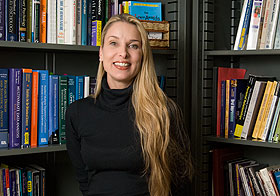  |
| HOME | THIS ISSUE | CALENDAR | GRANTS | BACK ISSUES | < BACK | NEXT > |
Communications professor studies dark side of relationships by Sherry Fisher - September 29, 2008 | ||||
| Melissa Tafoya has always been drawn to the dark side of human behavior. “I study the real-life stuff – infidelity, jealousy, aggression, and conflict,” says Tafoya, an assistant professor of communication sciences. Tafoya, who joined the UConn faculty in 2007, earned her bachelor’s and Ph.D. degrees in communication from Arizona State University’s Hugh Downs School of Human Communication. She has a long-standing interest in behavioral research. “Interpersonal communication is an interdisciplinary science, and since I was interested in psychology, sociology, and family studies, communication was a good fit for me,” she says. “The field is broad and diverse.”
Tafoya, who describes her research interests as eclectic, is working on several different studies. In one project, she is examining the variations in siblings’ experiences and interactions across different relationship types, including half, full, and step-siblings, in nuclear, divorced, and remarried families. “Siblings are your longest lasting relationship,” Tafoya says. “You’re stuck with your ‘full’ siblings. They’re your siblings no matter what. But with step-siblings there is more of a choice in terms of the kind of relationship you can have with them.” She also conducts research on the experiences of jealousy, envy, and rivalry in families, friendships, and romantic relationships. Her most recent study examined infidelity in romantic relationships. She conducted a study with a researcher from San Diego State University on what is called ‘communicative infidelity.’ The term was coined to describe an infidelity committed to ‘send a message’ to a partner. “The person is unfaithful intentionally,” says Tafoya. “The infidelity is a strategic and manipulative act. For example, a partner may be unfaithful because he or she is unhappy and wants to let the partner know.” Tafoya is also interested in the physiological effects of communication. In one study, she examined how people’s stress levels were reduced by expressing affection through writing a letter. The participants’ cortisol levels, heart rates, blood pressure, and blood glucose levels were measured. “We found that participants’ stress levels were significantly reduced when they wrote a letter of affection to somebody they cared about,” she says. Tafoya says much of her research is in areas that are understudied. “I’m interested in the things that we just don’t know too much about,” she says, “or where there are large gaps.”
Tafoya says teaching is one of her passions. This semester, she is teaching undergraduate courses on conflict management and negotiation, and interpersonal communication. She also teaches graduate courses on interpersonal communication theory and family communication. The interpersonal communication course includes an examination of identity, attraction, and love, as well as jealousy and infidelity. In that course, she tells stories about her own life, and has the students write about concepts and theories, then apply them to their own experiences. “I’ve had students tell me they left abusive relationships after taking my interpersonal communication course,” she says, “and others who’ve said it changed their lives. Everything I teach is applicable. The students take what they’ve learned in class and really think about it and talk about it.” For one of the assignments in that class, students have to find an article about relationships published in a magazine like Cosmopolitan or Maxim. They then compare and contrast the advice given in the magazine article to scholarly journal articles. “The students learn that the majority of articles in these magazines are oversimplified, and much of the time there are no similarities between the articles and the scholarly research,” Tafoya says. “For example, in magazines like Cosmo, there are articles about what a man finds attractive in a woman. They’re very sexist, and promote stereotypical gender roles. That’s just not what the research is showing.” The focus of her conflict management and negotiation class is on positive aspects of conflict. “When most people think about conflict, they think about hostility and negativity,” she says, “but we don’t spend too much time on that.” Instead, she teaches students ways to manage conflict constructively – in their own relationships, in organizations, and in intercultural interactions. “We talk about the negative stuff too,” she says, “but I want them to leave the class being able to manage conflict situations in an effective and appropriate manner.” |
| ADVANCE HOME UCONN HOME |

